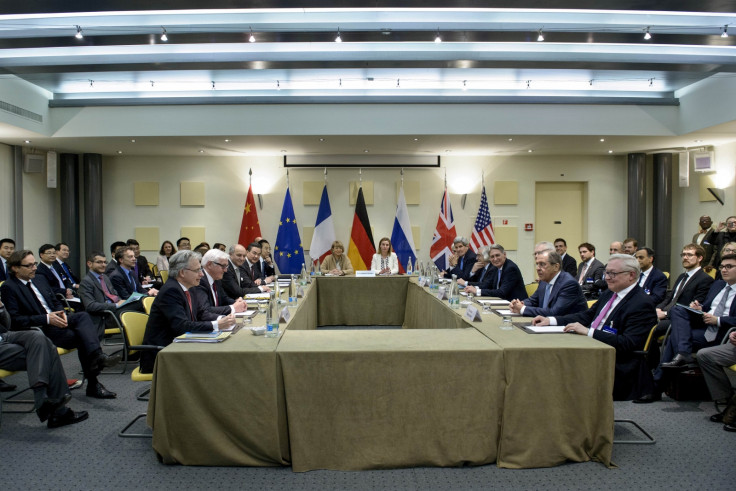Iran nuclear talks: 5 sticking points that could derail historic deal with the US and Europe

Iran already has an active nuclear programme, and the intention of talks between Tehran and the West is not to stop the country harnessing nuclear power but to prevent it from creating a bomb.
The problem is that it is a thin line between the two. The enrichment of uranium can be used both to develop nuclear power plants and to create nuclear weapons. Iran argues that it is entitled to do the former, but critics think its real goal is the latter.
As a result, many of the issues being debated by leaders including Secretary of State John Kerry and British foreign minister Philip Hammond in Lausanne, Switzerland, Monday are extremely technical - relating to the type of centrifuges and the speed and level to which uranium is enriched, or specific nuclear facilities in the country.
Others are simpler: should Iranian sanctions be lifted and if so, by how much? Will nuclear inspectors be allowed to turn up in Iran any time they like and check that the country has not reneged on a deal? And how long should the country be given to clean up its act?
Dealing with a deeply complex country that has traditionally referred to the US as 'The Great Satan' also has its own severe challenges, and plenty will hinge on the ability of Iran to sell any deal with the West with conservative elements at home.
IBTimes UK takes a look at the major hurdles ahead for the West and Iran.
Sanctions
'If they want an agreement, sanctions must go.'
Iran's main reason for engaging in talks in the first place, a lifting of the sanctions that have crippled the Iranian economy for decades is the chief demand from Iran's foreign minister Mohammad Javad Zarif.
"Our negotiating partners - particularly the Western countries and particularly the United States - must once and for all come to the understanding that sanctions and agreement don't go together. If they want an agreement, sanctions must go," he said.
The US favours a phased approach to lifting sanctions, but that could be difficult for the Iranians to sell at home. Lifting UN and European Union sanctions will be relatively easy, but in the US there is heavy opposition from Republicans, who fear that Iran will renege on the deal.
A group of 47 GOP lawmakers recently wrote an open letter to Iran claiming that any agreement on sanctions sealed by President Barack Obama could easily be revoked, and the Speaker of the US House of Representatives has been growing closer to newly-elected Israeli prime minister Benjamin Netanyahu and his view that no deal should be sealed with Iran at all.
Uranium enrichment
Used to develop both power plants and weapons, uranium is key to the talks and a major issue between Iran and world powers. Iran currently has 19,000 installed enrichment centrifuges, with about 10,000 currently being used to enrich uranium.
When enriched to a low degree, uranium can be used to create energy, but to a high degree it can be weaponised.
Europe and US want that number reduced substantially, to demonstrate to the world that the country has no intention of making a bomb. Israel, which has been one of the biggest critics of the deal, says that Iran should have no enrichment capabilities at all.
Future development
Much of Iran's nuclear facilities are vastly outdated, and although it will probably commit not to run them during the talks, it wants to continue to develop them. The US wants a pledge not to.
One specific facilities is Iran's Arak facilities, which is a heavy water reactor that could be used to process heavy grade plutonium, a second route to creating a bomb.
The West will be hoping for an agreement to either shut down Arak or convert it to a 'light water' facility, which will be used for furthering development of nuclear power.
Ballistic missiles
Ballistic missiles have particularly worried Iran's neighbours in the Sunni Gulf and Israel.
Iran has them, and wants to keep them, but critics point out that ballistic missiles are the best way of delivering nuclear weapons - a factor which has particularly worried Iran's neighbours in the Sunni Gulf and Israel.
The UN banned ballistic missiles capable of delivering nukes in 2010 and the US wants Iran's stocks of missiles to be included in a discussion of any deal. Iran counters that its missiles are, like many other countries, part of its legitimate defence arsenal.
Inspections
A key stumbling block, particularly for the Iranians.
The International Atomic Energy Agency (IAEA) want access to Iran and its nuclear sights as and when it feel that the rules may be being breached, but pride alone will likely prevent Iran from allowing unfettered access to its country by a foreign body - particularly one associated with the US.
© Copyright IBTimes 2025. All rights reserved.






















